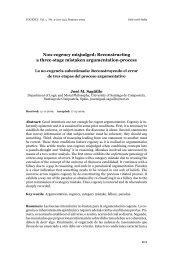Cogency v2 n2
Cogency v2 n2
Cogency v2 n2
You also want an ePaper? Increase the reach of your titles
YUMPU automatically turns print PDFs into web optimized ePapers that Google loves.
David Hitchcock and Bart Verheij (eds.), Arguing on the Toulmin... / J. RITOLA<br />
used in assessing practical reasoning and promises to increase our understanding<br />
of practical reasoning. Kock (p. 258) approvingly emphasizes that<br />
this tradition is committed to ‘multidimensionality’, i.e. the idea that practical<br />
reasoning is characterized by multiple kinds of warrants that cannot<br />
be weighed against each other on any common measure or single dimension.<br />
He notes that moral philosophers have called this ‘incommensurability’<br />
of warrants and argues that the ancient rhetoricians knew that decisions<br />
cannot be founded on a merely rational basis (ibid.)<br />
This is an interesting challenge for one is eager to find out what exactly<br />
are the non-rational elements that we should add to the justification of an<br />
action, given incommensurability. Kock (ibid.) argues that this is why rhetoric<br />
is needed, but this as such does not provide much elaboration. Kock defines<br />
rhetoric as the totality of resources at the disposal of arguers who wish<br />
to increase adherence to their standpoint in debates where the choices are<br />
optional. This ‘optionality’ means that in deciding what to do, there are many<br />
courses for which the individual agents may legitimately opt. These resources<br />
include, among other things, arguing that a given option is just, lawful, expedient,<br />
honorable, pleasant, and easy to accomplish. But these do not seem<br />
non-rational bases for arguments.<br />
The unavoidable property of optionality in practical reasoning, Kock argues,<br />
implies that “philosophy ends here, because philosophy is, in its very<br />
nature, about finding solutions that hold with equal validity for all” (ibid.).<br />
We might try to reconstruct Kock’s reasoning as:<br />
1. Some cases of practical reasoning exhibit optionality (i.e. the incommensurability<br />
of justifications for different actions).<br />
2. Philosophy is about finding solutions that hold with equal validity for all.<br />
3. Therefore, philosophy does not involve the study of practical reasoning<br />
in cases that exhibit optionality.<br />
But this argument exhibits fallacious reasoning about parts and wholes.<br />
The fact that philosophy studies the general conditions and nature of rationality<br />
does not imply that it is not able to study cases where some (or all)<br />
standards of rationality seem to fail. Also, premise two is not acceptable in<br />
its current formulation, because of its vagueness. What does it mean to say<br />
that a solution holds with equal validity to all? If a solution to the mind-<br />
169








